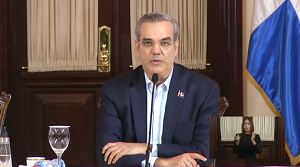
President Luis Abinader signed the Customs Law 198-21 that seeks to streamline, modernize and adapt to international norms and standards local import and export legislation. Law 198-21 incorporates the many international commercial and customs agreements signed over the past 30 years. The law has 420 articles.
During the presentation of the newly signed law at the Presidential Palace, Eduardo Sanz Lovatón, director general of Customs, stressed the law’s importance. He spoke of how the law is a major step forward towards making the Dominican Republic the logistics hub of the Caribbean region.
Speaking from the Presidential Palace, President Abinader called the new law a decisive step towards the promise of recovering the economy and boosting trade to create more opportunities for all Dominicans.
“Thanks to the joint work of the Congress of the Republic, the Customs Agency, and the public and private sectors, we now have a modern customs legislation that gives greater rationality to the national tax system and the regulatory framework for international trade,” he said.
The previous law dated back to 1953. In his presentation on Monday, 23 August 2021, Abinader said that the new law takes into account that international trade has evolved qualitatively and quantitatively since then. He explained it upgrades Customs regulations that have been impacted by new technologies related to transportation, logistics of international physical distribution of goods. It also incorporates the guidelines from international organizations that have an impact on foreign trade.
“All this made it unjustifiable that the Dominican Republic did not have a law in line with the new times,” said the President.
He added that this transcendental reform follows the trade policy guidelines established by the World Trade Organization and other international organizations, aiming to achieve a greater degree of simplification and harmonization of customs systems and regulations, eliminating cumbersome, generally bureaucratic procedures, discretionary power and legislative gaps that affected the operation of Dominican customs.
The new Customs Law punishes the crime of laundering in the trade of goods and creates a specialized prosecutor’s office to investigate customs crimes and offenses. It also seeks to increase the DGA’s participation in international economic integration processes, in accordance with the new foreign trade regulations.
It adds new definitions related to multilateral environmental agreements, green customs, types of gauging, documentary, physical, cold chain, international transportation, economic customs regimes, international trade terms following the “incoterms” or ICC rules for the use of international trade terms. It incorporates the use of electronic or digital signature. It allows online bank payments.
It also approves sending documents for preclearance before the arrival of the means of transport and accepts the sea waybill as a physical or electronic shipping document.
It incorporates recommendations made by the Financial Action Task Force of Latin America (GAFILAT), the Organization for Economic Cooperation and Development (OECD), among others.
Read more in Spanish:
El Caribe
Noticias SIN
El Dia
24 August 2021

